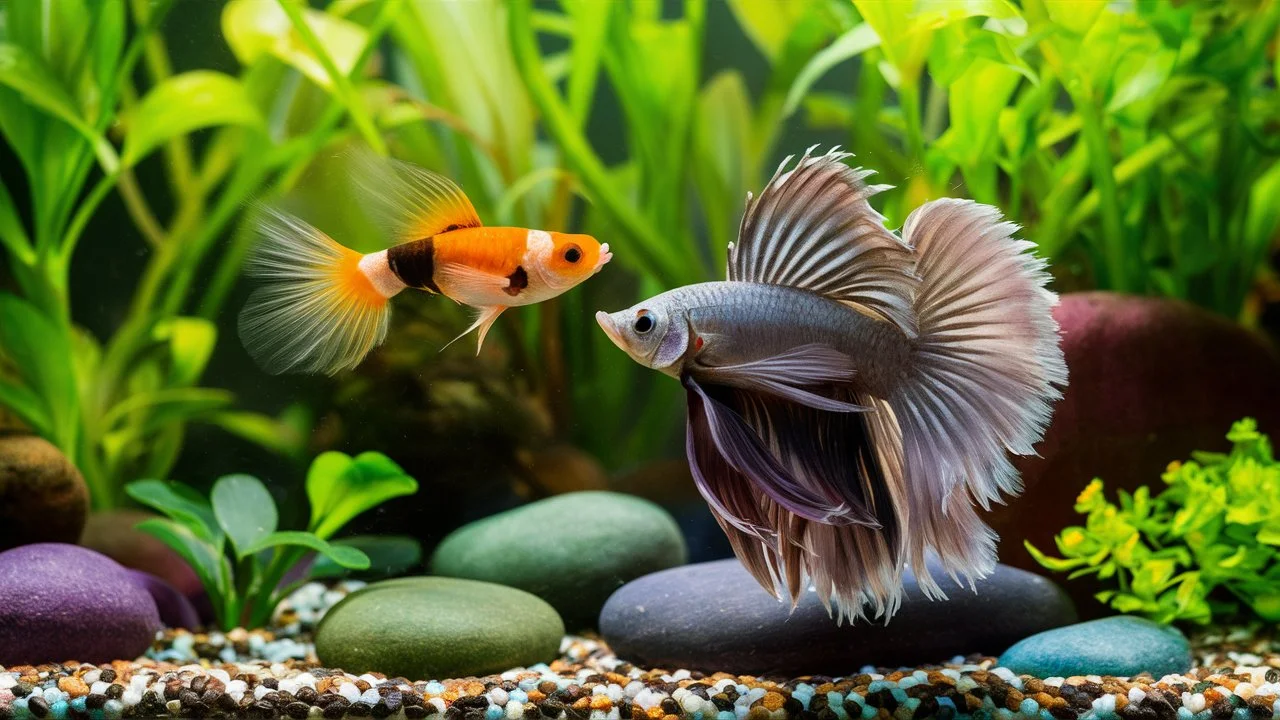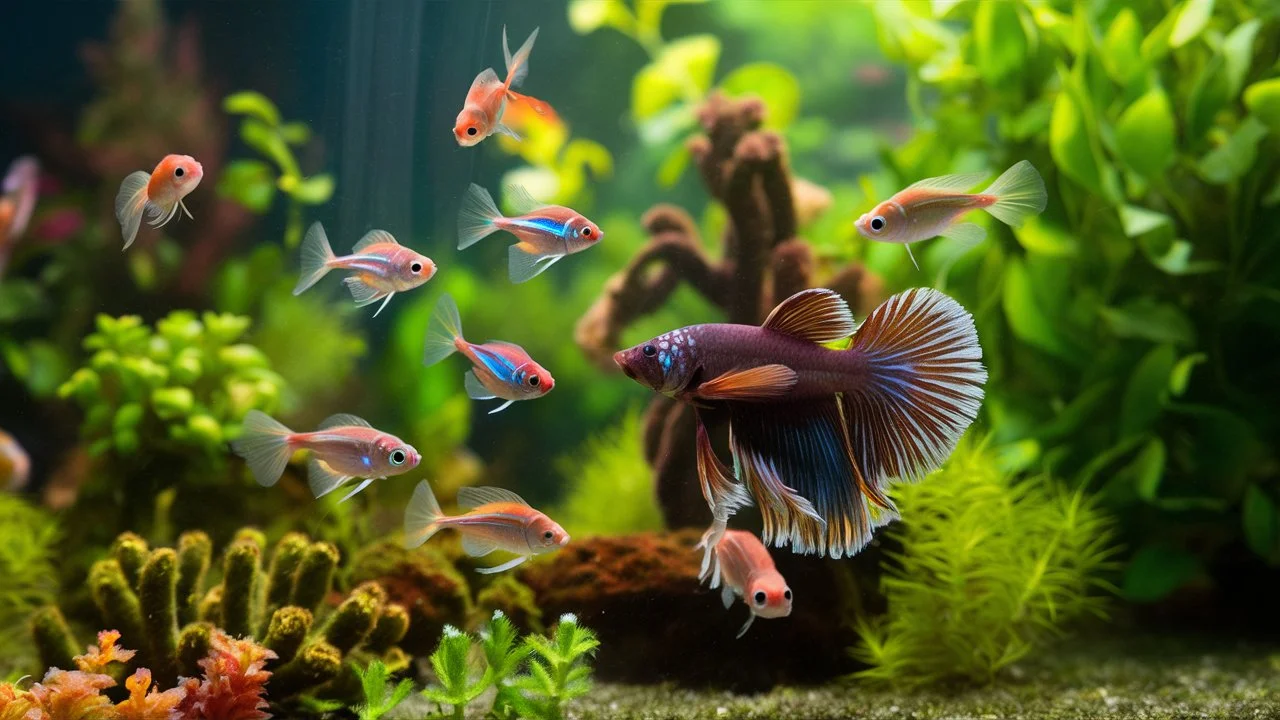Yes, guppies can live with Bettas, particularly female Bettas, as they are generally less aggressive than males. Ensure the tank is large enough (20 gallons or more) to provide ample space and reduce territorial disputes. Adding plenty of plants and decorations for hiding spots helps minimize stress. Regularly monitor their interactions and be prepared to separate them if any aggression occurs. With proper care and observation, guppies and Bettas can coexist peacefully.
Can Guppies Live with Bettas?
Guppies and Bettas are both popular choices for aquarium enthusiasts, but can they live together peacefully? Let’s explore whether these two species can coexist and what you need to consider to make it work.

Understanding Guppies and Bettas
Guppies
Guppies are small, colorful, and peaceful fish that thrive in community tanks. They are active swimmers and enjoy a variety of tank mates, provided those tank mates are not aggressive.
Bettas
Bettas, also known as Siamese Fighting Fish, are known for their vibrant colors and long, flowing fins. They can be territorial and aggressive, especially towards other Bettas or fish with similar appearances.
Related reading: Can Guppy Live With Betta In Same Tank?
Compatibility Factors
Temperament
- Guppies are generally peaceful.
- Bettas can be aggressive and territorial.
Tank Conditions
- Both Guppies and Bettas prefer warm water, around 75-82°F (24-28°C).
- Bettas need calm waters with minimal current, while Guppies are more adaptable.
Tank Setup
- Provide plenty of hiding spots and plants to reduce stress and potential aggression.
- A larger tank (20 gallons or more) can help reduce territorial disputes.
Tips for Keeping Guppies and Bettas Together
- Choose the Right Betta: Female Bettas are generally less aggressive than males, making them a better choice for community tanks.
- Monitor Behavior: Keep a close watch on the tank when introducing a Betta. Look for signs of aggression and stress in both species.
- Provide Hiding Spots: Use plants, decorations, and caves to create hiding places where Guppies can escape if needed.
- Feed Separately: Ensure both species get enough food by feeding them in different areas of the tank.
How Long Can Guppies Live with Bettas?
Guppies and Bettas can live together under certain conditions, but the duration of their coexistence depends on several factors. Here’s what you need to know to ensure they can live together as long as possible.
Key Factors for Coexistence
Temperament and Behavior
- Guppies: Generally peaceful and social fish.
- Bettas: Can be territorial and aggressive, especially males.
The temperament of the individual Betta is crucial. Some Bettas are more aggressive than others and may not tolerate tank mates well.
Tank Size and Setup
- A larger tank (20 gallons or more) provides ample space for both species to establish their own territories.
- Include plenty of plants, decorations, and hiding spots to reduce stress and aggression.
Water Conditions
- Both Guppies and Bettas thrive in warm water, around 75-82°F (24-28°C).
- Maintain clean water with regular water changes and a good filtration system.
Observation and Monitoring
- Monitor the tank regularly for signs of aggression or stress.
- Be prepared to separate the fish if aggression occurs.
Lifespan and Compatibility
Guppies: Typically live for 1-3 years in a well-maintained tank. Bettas: Can live for 2-5 years, depending on their care and environment.
Ensuring Long-term Coexistence
To maximize the time Guppies and Bettas can live together, follow these guidelines:
- Choose a Less Aggressive Betta: Female Bettas or less aggressive male Bettas are more likely to coexist peacefully with Guppies.
- Introduce Gradually: Introduce the Betta to the tank after the Guppies to reduce territorial behavior.
- Provide Plenty of Space: A larger tank with lots of hiding spots and plants helps reduce territorial disputes.
- Regular Monitoring: Keep a close eye on their behavior and be ready to intervene if necessary.
Can Guppies Live with Female Bettas?
Guppies and female Bettas can often live together more harmoniously than with male Bettas. However, there are still important considerations to ensure their coexistence is peaceful and healthy. Here’s what you need to know.
Key Considerations for Keeping Guppies with Female Bettas
Temperament and Behavior
- Guppies: Peaceful and social fish, known for their vibrant colors and active swimming.
- Female Bettas: Generally less aggressive than male Bettas, but they can still be territorial and show some aggression.
Tank Size and Setup
- Tank Size: A minimum of 10 gallons is recommended, but 20 gallons or more is better to provide ample space and reduce territorial behavior.
- Aquascaping: Include plenty of plants, decorations, and hiding spots. These elements help reduce stress and give fish places to retreat if needed.
Water Conditions
- Temperature: Both species thrive in warm water, around 75-82°F (24-28°C).
- Water Quality: Maintain clean water with regular water changes and good filtration. Both species prefer stable, well-maintained water conditions.
Tips for Successful Coexistence
- Introduce Female Betta Last: If possible, add the female Betta to the tank after the Guppies. This can help reduce territorial aggression since the Betta won’t see the tank as her established territory.
- Monitor Behavior: Keep a close watch on the interactions between the Guppies and the female Betta. Look for signs of stress or aggression, such as nipping, chasing, or hiding.
- Provide Hiding Spots: Use plants, caves, and decorations to create plenty of hiding places where fish can retreat if they feel threatened.
- Feed Properly: Ensure both species get enough food by feeding them in different areas of the tank. This can help reduce competition and stress during feeding times.
Benefits of Keeping Guppies and Female Bettas Together
- Aesthetics: Both species are colorful and active, adding visual interest to the aquarium.
- Algae Control: Guppies can help with algae control, while Bettas add a unique presence with their vibrant colors and graceful movements.
Potential Challenges
- Aggression: Even female Bettas can exhibit aggression, so it’s essential to have a plan to separate them if necessary.
- Health Monitoring: Regularly check both species for signs of stress, disease, or injury. Promptly address any health issues that arise.
Can Guppies Eat Betta Food?
Yes, guppies can eat betta food, but there are a few important considerations to keep in mind. Betta food is formulated specifically for the dietary needs of bettas, which are primarily carnivorous, while guppies are omnivores. Here’s what you need to know about feeding guppies betta food.
Nutritional Needs
Guppies:
- Diet: Guppies are omnivores, which means they eat both plant and animal matter.
- Nutrition: They require a balanced diet that includes proteins, vegetables, and other nutrients to stay healthy.
Bettas:
- Diet: Bettas are primarily carnivorous and require a diet rich in protein.
- Nutrition: Betta food is typically high in protein and includes ingredients like fish meal, shrimp, and other animal proteins.
Feeding Betta Food to Guppies
Occasional Treat:
- Guppies can eat betta food as an occasional treat. The high protein content in betta food can be beneficial, especially for pregnant or young guppies that require extra protein for growth and development.
Not a Staple Diet:
- While guppies can consume betta food, it should not be their primary food source. A diet consisting solely of betta food may lack some essential nutrients that guppies need, such as plant matter and certain vitamins.
Variety is Key:
- To ensure guppies receive a well-balanced diet, it’s important to provide a variety of foods. This can include high-quality flake food, pellets designed for omnivorous fish, live or frozen foods (like brine shrimp and daphnia), and vegetables (like blanched spinach or peas).
Tips for Feeding
- Balanced Diet: Incorporate betta food into the guppies’ diet occasionally, but ensure their main diet consists of food formulated specifically for omnivorous fish.
- Watch for Overfeeding: Betta food is rich and can lead to overfeeding if given in large amounts. Feed in moderation to avoid digestive issues and water quality problems.
- Observe Behavior: Monitor the guppies after feeding them betta food to ensure they are eating it well and not showing any signs of distress or digestive problems.
Conclusion
In conclusion, guppies and Bettas can live together, but careful consideration and proper tank management are essential. Female Bettas are generally a better choice due to their less aggressive nature compared to male Bettas. Ensure the tank is spacious, well-decorated with plenty of hiding spots, and regularly monitor their interactions to prevent any issues. With the right conditions and attentive care, guppies and Bettas can coexist peacefully, adding beauty and diversity to your aquarium.

1 thought on “Can Guppies Live with Bettas? Tips for a Peaceful Aquarium”